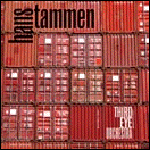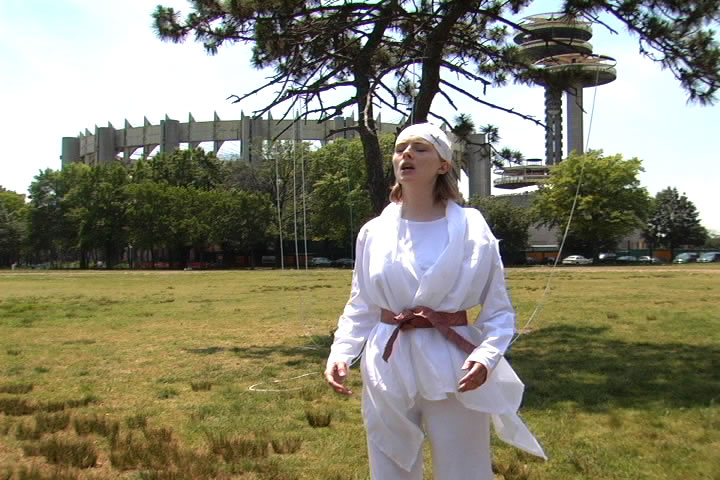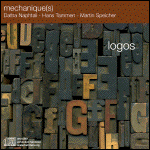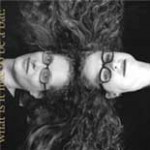 Innova 225, recorded 2006 at Roulette, New York, released 2008 on Innova, the label of the American Composers Forum. Total Time: 79:34 Minutes. With Mari Kimura (vio), Mark Feldman (vio), Stephanie Griffin (vla), Tomas Ulrich (cel), Briggan Kraus (as, bari), Marty Ehrlich (bcl, fl), Robert Dick (fl, cbfl), Detlef Landeck (tb), Dafna Naphtali (voice, live sound processing), Ursel Schlicht (p/kb), Deman Maroney (p/kb), Stomu Takeishi (b), Satoshi Takeishi (perc), Hans Tammen – concept, realtime arrangement.
Innova 225, recorded 2006 at Roulette, New York, released 2008 on Innova, the label of the American Composers Forum. Total Time: 79:34 Minutes. With Mari Kimura (vio), Mark Feldman (vio), Stephanie Griffin (vla), Tomas Ulrich (cel), Briggan Kraus (as, bari), Marty Ehrlich (bcl, fl), Robert Dick (fl, cbfl), Detlef Landeck (tb), Dafna Naphtali (voice, live sound processing), Ursel Schlicht (p/kb), Deman Maroney (p/kb), Stomu Takeishi (b), Satoshi Takeishi (perc), Hans Tammen – concept, realtime arrangement.
To buy check Innova’s website here: http://www.innova.mu/artist1.asp?skuID=336
Liner Notes by Howard Mandel
Composer-conductor-endangered guitarist Hans Tammen is fascinated with creative spontaneity, which is not to say improvisation, if “improvisation” suggests a lack of planning, disregard for expectations and acceptance of casual results. Everything about Third Eye Orchestra, in which Tammen directs 13 of the most virtuosic instrumentalists to ever elude labels or boundaries, indicates mastery and control.
Yet Third Eye Orchestra’s musicians are called upon to assert and enjoy — for their composer-conductor, audience and not least of all themselves — enormous freedoms in their contributions to the ultimate shape of multiple movements adding up to a heroic chamber symphony (or two). Given the multiple results which issue from a single “composition” conducted (and so, created) twice through by Tammen in successive sittings of his ensemble, this album’s two versions, “Antecedent” and “Consequent” (each broken into six titled parts, according to Tammen by coincidence but for convenience) demonstrate how compositional and interpretive processes can work together to everyone’s benefit. Neither composers nor improvisers subjugate themselves under such a plan. And the music that emerges can boast both enough rigor of form and flights of fancy to satisfy all involved.
This was, no doubt, Tammen’s plan from the point of his inspiration by Earle Brown’s “Available Forms” and his determination to assemble an all-star ensemble for an evening-length concert. Third Eye Orchestra documents an extraordinary gathering in December 2006 of New York “downtown” players at Roulette, the most venerable yet diversely lively of all independent downtown performance spaces to feature new and experimental music, as it’s done since 1978. Glancing at the convened personnel, one is hard-pressed to find a player who has not presented music of their own design at Roulette, and several of the soloists (they are all soloists) are acclaimed as not just virtuosi but innovators on their instruments. As spontaneous composers-improvisers-call-them-what-you-will, these musicians do not stop even at devising new techniques; their aim is to use those techniques for purposes of self-expression. Considering the sensitivity and sophistication of their accomplishments across all these dimensions, it would be wasteful folly for a composer to dictate notes to them. But considering the wealth of ideas the collective can summon instantaneously, preconceived plot and guidance through it seem desirable, if not essential.
Though Tammen draws from a single repertoire of some 150 pre- conceived musical units for both performances of Third Eye Orchestra here, he never intended to cast the two performances in a single mold. “Opening” (set 1, part 1) starts with Mari Kimura’s exquisite violin exposition backed by low pitch alternations and a second intersecting part for a different subgroup of instruments, and makes the concert instantly welcoming by posing it as calm, perhaps meditative, clear and enveloping, moving gradually from near-unison towards polyphonic, polytimbral, polyrhythmic and polymetric complexities.
The mood changes radically as alto saxophonist Briggan Krauss asserts a rough-edged leading voice in “Death Clock,” and the brothers Stomu and Satoshi Takeishi (bass and percussion, respectively), along with pianist Ursel Schlicht, become ever more insistent, but the strings that follow them refer to the parts established in “Opening,” even as flutist Robert Dick takes off on a tangent of his own. The live sound processing Dafna Naphtali conjures in “Mdina Experience” even as she’s singing wordless harmony, triggers an episode that floats over Marty Ehrlich’s bass clarinet and rhythmic outbursts, leading to Detlef Landeck’s heroic trombone feature (he flew to New York from Germany, just for this concert), out of which comes a flute-contrabass flute (Ehrlich and Dick) duet that’s almost pastoral in nature, joined by Stephanie Griffin on viola, then Tomas Ulrich on cello. Mark Feldman’s tender violin, leaping to a penetrating high note over pianists Schlicht and Denman Maroney’s contemplative chords in “Verrano,” reset the overall mood. “Triadic Closure” commences with high-string tension, gains lowest register rumbles and Naphtali’s voice and processor-sweeps, horn riffs, off-kilter drum punches, Schlicht’s keyboard-spanning touches, and Krauss’s baritone sax squall to a pin-point end.
Suffice it to say Tammen’s second set has none of the first’s passages; “Consequents'” six parts do not even match the lengths of “Antecedent’s.” The moment was different, for players and audience alike certainly as cast to a degree by the effect of the first set’s parts. So how could the musicians, or the conductor/ composer, settle for the same?
It is difficult, nay impossible, to assert that either performance is “better” than the other, especially when the digital format of this album allows a listener to reshuffle the sequence of parts to his or her own heart’s content. There are many strikingly beautiful moments — for instance, the tutti comprising much of “Subtle Inconsistencies” — due to the combined talents of Tammen and his musicians; they would surely be less “beautiful,” cogent or coherent without either composer-conductor or this particularly alert and quickly responsive musical cohort. The combination of the two arrives at something inseparable, a sonic event that wraps impulse around forethought in a way that each survives and thrives. Take the single point of view of a composer-conductor, add in the multiple perspectives of a baker’s dozen top-flight instrumental improvisers, and come up with sound that’s broad and penetrating, all encompassing yet selective, too. Every listener may decide, individually, whether this is composition or improvisation, or a third thing that springs from the intermingling of those two, bearing forth Third Eye Orchestra. — Howard Mandel
Howard Mandel, contributor to Down Beat, SignalToNoise, The Wire and National Public Radio, is author as well of Miles Ornette Cecil — Jazz Beyond Jazz (Routledge, 2008).
Jacob Baekgaard (AllAboutJazz)
In jazz circles, New York is known for cultivating the sounds of the cutting edge; club Roulette has shown a particular seismographic ability to know what’s happening at the fringes of jazz. If anything, the release of Hans Tammen Third Eye Orchestra underlines this with striking clarity.
An innovative avant-garde guitar guru, Hans Tammen is mostly known for his elusive technique of endangered guitar, but he’s also the visionary behind the interesting contemporary avant-garde ensemble, The Third Eye Orchestra. Hans Tammen Third Eye Orchestra presents a live concert recorded at the Roulette. The pure thrill of exploring a world of sound really shines through on this release, which is nothing short of breathtaking.
The idea behind The Third Eye Orchestra is to gather some of the most exciting musicians on the improvising scene and let them perform music of instant composition under Tamman’s guidance. The result is an otherworldly music that feels both thoroughly composed and purely improvised. Formally, the album is split into two sections: “Antecedent” and “Consequent.” Each section is divided into six parts and every part brings forth different solo voices. “Part V – Verrano,” for example, features Mark Feldman’s awe-inspiring violin, who lets the notes soar like birds above the ground, spreading the light against the night sky of Denman Maroney’s muffled, repeated keyboard figures.
The conclusion to “Antecedent” is just as impressive, with vocalist Dafna Naphtali chanting over washes of violin sounds and gentle noise. This is the language of poetic creation, with words compressed to pure sound: humming, scatting and screaming. “Consequent” starts with Briggan Krauss’ honking baritone sax and settles into an abstract groove, only to evolve into a beautiful dialogue between Maroney and violist Stephanie Griffin.
The orchestra includes a wealth of musical voices, but what’s most amazing is how the individuals intuitively find their places in the sheets of sound, alternating between intimate, whispering confessions and cacophonic chaos. Overall, the mood of the album is tranquil, with rich textures and explorations of sound, rhythm and melody.
Ideally, music should appeal to all senses but it is as if this music actually instills a sixth sense or, perhaps, a third eye. What is cultivated then, is a new way of listening, which is what the historical avant-garde was always about—a new way of perceiving the world. Hans Tammen Third Eye Orchestra is a complete work of art that has the ability to change the world: a masterpiece of musical evocation.
Original Link
Marc Medwin (AllAboutJazz)
This is a stunning live recording from one of improvised music’s most fascinating proponents. Hans Tammen has gathered a dream team of 13 improvising musicians, but that’s hardly the totality of this project, which combines composed material with extemporization to create a score whose modus operandi is constant change on every level.
This is one of those discs that verbiage won’t encapsulate. The music on offer here is not to be compartmentalized, though it exists in discrete but connected sections. These large-scale vignettes might morph and grow with slow intensity or they might groove hard, but they share the performers’ penchant for timbral exploration. Check out the engagingly free inter-registral solo that opens the disc, courtesy of the wonderful violinist Mari Kimura. Below and around it, long-toned exhalations bloom and hang suspended, pause, then recur. They prefigure the final section of “Antecedent,” with its long looming tones shot through with tasteful signal processing, bringing a perfect sense of closure to the disc’s first half.
Journalist Howard Mandel’s liners state that “Consequent” is an alternate version of “Antecedent”‘s material. So different is the execution that resemblances become less important than what occurs in each moment. As its second part, “Subtle Inconsistencies,” unfolds, we can revel in the unique pianism of Denman Maroney as it dissolves effortlessly into Stephanie Griffin’s viola lead.
The production is as good as the music is diverse. Each musician’s identity is readily apparent while a unity is maintained. The Roulette audience is remarkably restrained and it is hard to believe this is a live recording without the accompanying documentation. Mandel’s notes are to the point; he resists hyperbole, focusing instead on simple elucidation of Tammen’s concepts and their genesis.
This is an excellent disc from a musical maverick whose approach keeps evolving. Not easy listening by any means, it will please those with a taste for long-form adventure.
Original Link
Ken Waxman (JazzWord.com)
Expanding his electro-acoustic expertise to a creation for large ensemble, on this CD German-born, New York-based endangered guitarist Han Tammen presents two mesmerizing suites from his 13-piece Third Eye Orchestra.
Apparently unfazed by the superstition about 13, Tammen doesn’t perform, but instead conducts and arranges in real time. Likewise ignoring the superstitious angle, some of Manhattan’s most accomplished and innovative musicians – and one ringer – handle with aplomb Tammen’s creation which calls for equal facility with improvisation and notated music, acoustic instrumental techniques and familiarity with electronic excursions. Although billed as two, six-part versions of the same piece – “Antecedent” and “Consequence” – it’s a tribute to all concerned that neither version mirrors the other. While the separately titled tracks exhibit certain homogeneity, soloists never eschew individuality even while blending with the others in section work or contrasting passages.
The ringer here is trombonist Detlef Landeck, a musical associate of Tammen’s from the Fatherland. Having flown from Germany especially for the concert, his contributions are particularly expressive. On “Antecedent: Part III: Mdina Experience” for instance, the measured dual keyboard pulsations and backbeat percussion cushion a contrapuntal duet between Stomu Takeishi’s thumb-popping electric bass and Landeck’s wide-ranging brays and blurts that finally swell to full-fledged gutbucket slurs. Mixing Trad Jazz-style wah-wahs and New music-like staccato tonguing on “Consequent: Part I: Istres Control”, Landeck matches Briggan Krauss’ baritone saxophone growls which in themselves proceed chromatically with the single-mindedness and strength of a boar searching for truffles. Then as part of Consequent’s finale, the last measures of pitch-sliding strings plus percussionist Satoshi Takeishi’s dense backbeat are superseded by dexterous tongue slaps and unaltered air forced through Landeck’s s horn’s body tube, adumbrating the concluding silence.
Overall nearly every sonic incursion corresponds with Tammen’s game plan, and eventually becomes interlocking parts of the whole. Hear Krauss’ work for other instances. Not just a low-pitched sax specialist, on alto saxophone he contributes jagged glissandi that at times balance the subtle murmuring from Dafna Naphtali’s sound-processed voice and elsewhere provide altissimo comments on metronomic piano chording. Meanwhile, Robert Dick’s sharp flute shrills moderate Krauss’ low-pitched sax lines at points and in another instance operate alongside spiccato slides from the string quartet.
Among the other textures in use by members of the lucky 13 are mercurial pitch-sliding and sharp, dissonant string slices from cellist Tomas Ulrich; zither-like twanging and rebounding from Denman Maroney’s prepared piano; plus Ursel Schlicht double-timed syncopation that expands from pecking, clipping and popping whether she plays acoustic piano or electric keyboard.
Not that some instruments’ traditional tones are neglected either. “Antecedent: Part V: Verrano” for example, begins with a violin solo from Mark Feldman that is almost classically pure in execution. As Maroney’s keyboard contributes further flowing patterns, the result resembles a chamber recital – especially when the other strings join with unison romantic glissandi.
Taken as a whole, both versions of the composition abound with similar connections and contrasts. “Consequent: Part IV: Intentionally Left Blank” for one, layers abrasive and shuddering multi-stops from the strings alongside vamping horn timbres and burbling, motor-driven electronic whizzing, held together by a solid bass line. But to isolate the praiseworthy skill that goes into the band members creating yet another slithering keyboard run or a bit of flying spiccato from a fiddler would be pointless.
More generic to the session is the realization that as a conductor, arranger and conceptualizer, Tammen now appears to have equaled his skill as an instrumentalist. One would hope that more large-scale works are planned for the future.
Original Link
Bruce Gallanter (DMG)
…for this disc, perhaps’ Hans finest moment yet, he has dispensed with his guitar altogether and he plays or directs an amazing downtown all-star orchestra. At first I was surprised that I missed this dynamite concert, but realized later that it was the same month that Manny & I curated at The Stone, hence I was there every night but Mondays, when The Stone is closed.
This disc is split into two halves with 6 parts in each. The first six parts are called “Antecedent” and the second are called “Consequent.” Hans brought together a most impressive downtown all-star orchestra for this concert and session. Right from the beginning of “Opening,” the great microtonal specialist violinist Mari Kimura is dazzling us with her beyond-the-limits of normal range playing. I love the minimal, haunting background suspense while Marty Ehrlich plays his cautious bass clarinet. Each section features a different soloist or handful of soloists playing an inspired solo(s) over Hans’ consistently engaging charts and/or direction. I dig the bent and barbed music that Hans has written, sections often don’t last too long before they are transformed into another quirky section. Hans’ wife, Dafna Naphtali is an extraordinary experimental vocalist and performs a few short but exciting solos. There are a number of superb solos from Mark Feldman, Detlef Landeck (a new name for me), Briggan Krauss, Robert Dick and Denman Maroney. This entire piece sounds well-planned, well-recorded and well-executed. Plus it is nearly 80 minutes long and it is consistently riveting for that long duration. Quite a great of big bang for your ($14) buck. Again, the good folks at Innova have provided us with another modern day classic.
Chris Kelsey (Jazz.com)
Those familiar with Hans Tammen most likely associate him with “endangered guitar,” the term he’s given his highly processed, largely textural electric guitar concept. Third Eye Orchestra is another aspect of his musical personality. Recorded live at Roulette, Downtown NYC’s premier presenter of experimental music, Tammen guides a group of 13 exceptional free improvisers through two performances of his minimalist-inspired, multi-movement composition titled “Antecedent” (in its first guise) and “Consequent” (in its second). “Part I: Opening” begins with the eel-y improvised squiggles of Mari Kimura’s violin. Groups of instruments make measured entrances. The atmosphere intensifies, then calms, as Marty Ehrlich plays a tightly focused, dynamically restrained bass clarinet solo. Ehrlich’s improvisation ends the movement, yet serves largely as a segue into the next section, as Tammen’s charges go on to explore nearly 80 minutes’ worth of a nicely balanced mixture of improv and composition.
Matthew A. Somoroff (Jazz Perspectives 2009)
Hans Tammen’s Third Eye Orchestra documents a 2006 live concert at New York City’s Roulette venue. Roulette—along with the Knitting Factory, NuBlu, the now-defunct Tonic, and its successor, The Stone—remains a stronghold of the Downtown experimental music scene in Manhattan. Melding elements of free jazz, experimental rock, electronica, and contemporary concert music, Third Eye Orchestra sits comfortably within the (anti)genre of “Downtown.” Tammen’s role on this album is similar to that of Butch Morris in the latter’s “conductions.” Here, Tammen directs a thirteen-piece ensemble through two semi-structured improvisations titled “Antecedent” and “Consequent.” The members of this ensemble will be familiar to followers of the Downtown scene, as this group includes violinist Mark Feldman, multi-wind player Marty Ehrlich, flautist Robert Dick, and keyboardist/hyperpianist Denman Maroney.
Most fans of avant-garde jazz can recall times when collective improvisations that deliberately flout generic boundaries have become self-indulgent, runaway musical trains that alienate the audience. Thankfully, this is not the case with Third Eye Orchestra. What I assume to be Tammen’s direction tempers the prodigious talents of the group’s thirteen musicians and keeps the musical events flowing with an attention to timbral and stylistic variety. A passage early on in “Consequent,” might be found in a chamber work by Olivier Messiaen or Toru Takemitsu. Here, winds and strings play in a high register accompanied by bright dissonant chords on piano. Ultimately, electric bassist Stomu Takeishi enters with a riff resembling Miles Davis’s “Ife,” now accompanying a flute solo (track 8, 5:35, through track 9, 3:26). Later on, brass and strings play an agitated, one-note riff as a background to free blowing by winds and electronics (track 9, 8:15-10:35). Just as this texture veers further toward a chaotic mass of convoluted and overlapping melodies, electric bass and drums enter to provide a heavy, rock-influenced bottom to the proceedings, eventually taking over the texture to engage in a drum and bass duet (track 10, 4:30-7:43; this time marking refers to the entire descriptive sentence which precedes it).
Jazzreview.com
Third Eye Orchestra is the brainchild of New York composer Hans Tammen. The thirteen-piece ensemble consists of some of the Big Apple’s most notable modern improvisers, each capable of delivering on-demand virtuosity. Recorded live in 2006, the disc consists of two lengthy suites: “Antecedent” and “Consequent.” The performances are all slightly pre-conceived, lightly structured provocations, enticing group oriented spontaneity from each musician.
Dark, sometimes brooding ensemble passages mix and mingle with extended solo cadenzas, creating layers of intensity, at times unsettling and frantic. Tammen’s compositional arsenal includes simple vamp figures (“Opening,””Coup D’Archet” and “Triadic Closure”) and bombastic clusters (“Istres Control,””Intentionally Left Bank”). Each piece melds into the next, creating a continuous motion of ever-changing sonic coloring.
One of the disc highlights, and there are many, is the string section extravaganza on “Treadmill” featuring violin soloists Mark Feldman and Mari Kimura with violist Stephanie Griffin and cellist Tomas Ullrich. Other notable solos come from alto saxophonist Briggan Krauss on the rocked-out “Death Clock,” trombonist Detlef Landeck on “Mdina Experience” and fretless bassist Stomu Takeishi rendering a distorted tirade at the end of “Intentionally Left Bank.”
Full of spontaneity and unconventional risk-taking, Third Eye Orchestra is a captivating ride, winding through improvised peaks and valleys.
Jay Collins (Cadence Magazine)
…The proceedings unfold cohesively, though there are many high water marks worth mentioning. As for the first section, “Antecedent,” thrives due to Mari Kimular’s textual musings on “Opening,” Briggan Krauss’ turbulent alto on “Death Clock,” Detlef Landeck’s haughty trombone amidst the Takeshi brothers’ roiling groove on “Mdina Experience” and the marvelous string-play during the last two sections, especially Mark Feldman’s violin and the processed vocals of Dafna Naphtali.
As for “Consequent,” Krauss’ excitable baritone work boils against the Takeshi groove, the strings swirl and an electronically manipulated vamp eventually emerges on “Zipangu,” spurred by Ehrlich’s fierce bass clarinet reverie. The final three sections continue the vibrant mix of instrumental collages, a blending of foreboding minimalism, solemnity, high-level sound processing and terse, hidden melodies meant to remind that within these shrouds of experimentalism, melodic counterpoint can serve as an effective hallmark. On the whole, the experience is, for the most part, riveting. While some of the moments do become somewhat unwieldy, Tammen’s unique fusion of composerly and improvisational terrains and a collective of brilliant soloists provide a wonderfully unique endeavor.
Bill Meyer (The Wire)
As improvising orchestras go, Hans Tammen is rather conservative. By setting himself up as a composer and conductor – the carefully articulated string passages should clue you to the presence of a score even if you never see the picture of Stomu Takeishi reading sheet music in the CD booklet – he retains a fair degree of control over the shape its music takes. His habit of rearranging the composition between performances, as he has done here, introduces enough variability that you might never know that the album’s two pieces are founded on the same material, but it also tips the balance away from total freedom.
Sam Prestianni (East Bay Express)
…too much ugly, too little beauty…








